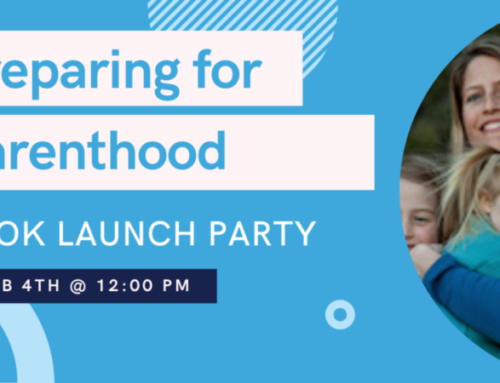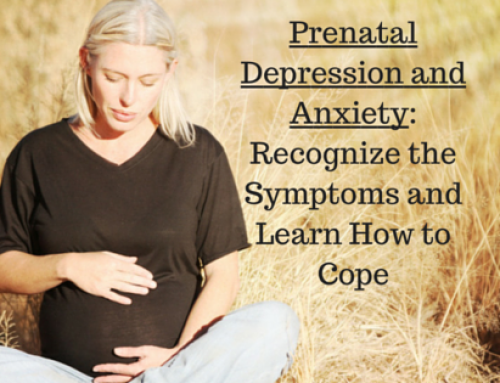Dr. Stephanie Dueger is a psychotherapist, educator, and parent coach who focuses on helping expectant and new parents and their little ones enhance their relationships with each other. While she has extensive training in helping others navigate moving from couplehood to becoming a family, the reality was more challenging than she expected in her own life.
“It was so humbling, to walk through that door of becoming a parent, and realize all the advice that I’d been so eagerly giving to these new parents about what they should be doing was based on theory instead of experience. And my husband and I both figured out that there were many conversations that we wished we had had prior to having our first baby.”
Dr. Dueger and her husband, who is also a therapist, soon realized couples could benefit from examining issues and having conversations around parenthood before their children are born, when parents aren’t as sleep-deprived, under-resourced, or emotionally stressed. Her newly released book, “Preparing for Parenthood: 55 Essential Conversations for Couples Becoming Families” targets specific areas to help couples think through the large and small issues that arise when a child joins the mix. Below, Dr. Dueger discusses a few of the questions she raises in her book.
The Importance of One-On-One Communication
Underlying all other topics is the importance of feeling seen and heard. Partners will feel stretched to experience this without regular one-on-one communication. Though Dr. Dueger admits this can be challenging when new parents may be drained of energy and on edge, it’s imperative for them to hear what the other person is saying. “Often when the conflict is high, when the emotions are high, the other person is just trying to jump in and get their side of the story heard. This is slowing the process down. So one person is talking, the other person is listening and reflecting what they hear.” By practicing this technique, couples lay a solid foundation to really listen to each other as difficulties emerge with parenthood.
Defining Roles within the Family
Roles are not something many couples talk about before marriage, let alone before having children. Most people fall into their roles naturally. One person likes to cook while the other person may be the organizer and likes to clean. Perhaps one partner likes to budget and the other does the groundwork by doing the majority of the shopping. Then a baby joins the mix and upsets the balance entirely. In her book, Dr. Dueger emphasizes setting expectations for each parent and setting timelines for those expectations.
For example, if the birth mother is going to feed the baby and rest, what are the expectations for the partner? Do they take on all the chores for a short period of time? Who will feed and walk the dog? Who is responsible for doing the dishes? Even though it sounds simple, having these roles defined for the initial part of the newborn experience can help partners avoid challenging disagreements. Dr. Dueger suggests partners agree to lower household expectations for a period of time after birth, look for support from family, friends, or services, and focus on solutions that work for the family.
Discipline Downfalls
Although discipline doesn’t come into the picture until a baby is a bit older, it can be a topic that causes considerable stress for a couple if they haven’t discussed their plan. Many couples might discuss discipline methods before children are born, but the reality of disciplining a two-year-old can be a rude awakening. It’s important that parents are on the same page. “People often come in on different pages around discipline. Usually it’s about how they grew up. Either they have an intention of raising their children the way that they grew up, or they want to do the complete opposite. And a lot of what that boils down to, in my opinion, is understanding your history.”
Dr. Dueger encourages couples to use the questions surrounding discipline in her book to get to know themselves better and take time to reflect. Ask, “Why do I do the things that I do? Does that really reflect who I am and who I want to be? Where does that come from? If you haven’t delved into your own past, especially around things like parenting, the way that you were parented, and the way that you were disciplined, it’s a good time to do that prior to having a baby, so that you don’t tumble into, say, the terrible twos and feel like you have no idea what you’re doing.”
New parents don’t have to default into what their parents did, or take a 180 degree turn from it, either. Exploring these questions allows parents the option to actively choose how they want to discipline their children.
Your Relationship Is the Foundation
When a new baby arrives, it’s easy to lose focus on each other. The demands of a newborn can seem infinite, and as the baby grows, it’s easy for parents to grow apart. “If you’re going into parenthood as a couple, you have to put your relationship as the foundation,” Dr. Dueger emphasizes. “Your child’s needs are going to take precedence a lot of the time. But if you can, take time to also schedule a date night, or just make time to find connection time. It’s so critical.”
Parenting is a 24-7 job and the first few years are intense. Without focusing on the relationship, partners can wake up feeling like they’re sleeping next to a stranger. Dr. Dueger admits it can take about three years for couples to find their footing again, and if they’re having children in succession, even longer to feel grounded again. “If you can keep at least a thread of (connection) going through the first three years…it’s really super helpful in terms of keeping your foundation steady.”
Excerpts from this article are drawn from Dr. Dueger’s appearance on the Healthy Births, Happy Babies podcast with Dr. Jay Warren. Find the full podcast at drjaywarren.com.
More information on Dr. Dueger’s book and on her therapy, coaching, and educational practice can be found at drduegertherapy.com







Leave A Comment